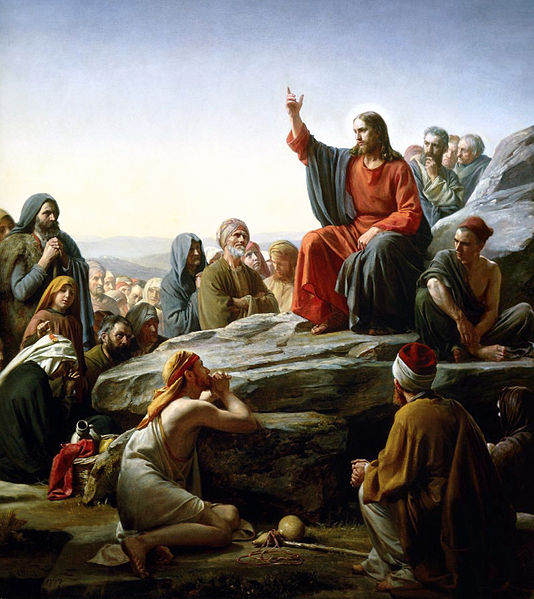イエスが地上での伝道を始めた方法を要約するのに、福音書記者マルコが使ったのはこの言葉だった。
[toggle]When Mark the Evangelist wanted to sum up the way Jesus started His earthly ministry, he used these words: [/toggle]ヨハネが捕らえられた後、イエスはガリラヤに行き、神の福音を宣べ伝えて言われた。「時が満ち、神の国が近づいた。悔い改めて福音を信じなさい」(1:14~15)
[toggle]Now after John was arrested, Jesus came to Galilee, proclaiming the good news of God, and saying, “The time is fulfilled, and the kingdom of God has come near; repent, and believe in the good news” (1:14–15). [/toggle]

カール・ハインリッヒ・ブロッホ「山上の説教」
イエスのメッセージを要約するのにマルコが使ったギリシア語の「バシレイア」は、行動を示す言葉として訳されるべきだろう。たとえば「支配する」とか「王になる」としたほうが本来の意味に近い。「神の国が近づいた」と言った時にイエスが宣言していたのは、イエスの伝道を通して、またそのただ中で、神がご自身の支配を主張していたということだ。
[toggle]The Greek word that Mark uses to summarize Jesus’ message—basileia—is probably better translated with a word that indicates activity. A word like “rule,” “reign,” or even “kingship” is closer to the original meaning of basileia—which means that when Jesus says “the kingdom of God has come near,” He is proclaiming that God is asserting His rule in the world in and through Jesus’ ministry. [/toggle]その支配とはどのようなものだろう。即位とは恐ろしいものだ。新しい王や指導者の即位は、不安で落ち着かない気分にさせることもある。新しい首相や大統領、君主がその権力を手にするのに恐れを抱いたことがないなら、あなたはとても稀(まれ)な人生を歩んできたといえる。歴史を通じて、今でも、また近代の欧米でさえ、新しい支配者へ権力が渡ることは、世界中の多くの人にとって不安なことだ。
[toggle]But what kind of rule will it be? Coronations can be terrifying. The enthronement of a new king or leader can make one queasy with dread. If you’ve never had to fear when a new prime minister, president, or monarch comes into power, then you have lived a life of rare privilege. For many people in the world—throughout history and also presently, even in the modern West—the passing of power to a new ruler is a matter of gnawing anxiety. [/toggle]映画「ゴッドファーザー」の最後のシーンは、私が今まで見た中でも忘れがたいものだが、この不安をよく捉えている。主人公のマイケル・コルレオーネは、甥(おい)の幼児洗礼式のため、豪華なカトリック教会の洗礼台のそばに立っている。エレガントなスーツに身を包んだマイケルの冷静な表情をカメラが捉える中、洗礼式とまったく同時刻に行われた、彼の指示した連続殺人のシーンがカットバックで描かれる。マイケルがニューヨーク・マフィアの中心人物となるために事を仕組み、血を流すことで支配の後継者となったことが分かるのだ。その支配のためには、邪魔者は誰であれ死んでもらう。この苦渋に満ちた衝撃的なラスト・シーンは、彼が新たな恐怖の君主、「ドン・コルレオーネ」として王座に就いたことを示している。
[toggle]A scene from the end of The Godfather—one of the most haunting pieces of cinema I’ve ever seen—captures this fear well. The protagonist, Michael Corleone, stands near the baptismal font in an ornate Catholic church for his nephew’s christening. As the camera lingers on his stoic facial expression and elegant suit, the scene cuts to a series of assassinations that Michael has orchestrated, which are happening at the very same time as the service of baptism. It turns out that Michael has arranged to become the kingpin of the New York mob, and he is ascend¬ing to his throne by means of a bloodbath. The cost of his rule is the death of anyone who stands in his way. The agonizing, devastating final scene of the film shows him being crowned, as it were, as “Don Corleone”—the new monarch of terror. [/toggle]フィクションであっても、この話は恐ろしいが、同じようなことが常に現実でも起きている。テロリストは権力を掌握する。悪は、貧しい人や病人を気にもかけない人に手を貸し、王国や政府の操作をし、市民は恐怖のうちに生活している。世界の多くの人にとって即位は、不安、心配、警戒の時なのだ。
[toggle]This fictional story is haunting enough, but similar stories happen in real life all the time. Dictators trample on human dignity to ascend their thrones. Terrorists seize the reins of power. Evil overlords who care nothing for the poor or the sick take control of governments and kingdoms, and the citizens consequently fear for their lives. Coronations, for much of the world, are occasions of uncertainty, worry, and alarm. [/toggle]おそらくイエスが教えていたとき、聴衆は同じような不安や警戒で心がかき乱されていたかもしれない。神の支配についてのイエスのメッセージを聞いて、即位の時にいつも生じる混乱した感情が呼び起こされただろう。新しい王の治世がどれほど厳しいものになるかという不安にふるえ、自分たちには対応できないような要求を王がするのではないかという心配にさいなまれ、王が始めるかもしれない戦争に脅えるのだ。これは、この世の王にはつきものだ。もしかするとイエスの聴衆は、預言者サムエルの言葉を思い出していたかもしれない。
[toggle]Perhaps that same worry and alarm was stirred up in the hearts of Jesus’ hearers when He preached. His message about God’s reign would have conjured up all the churning emotions that coronations usually conjure up: the trembling uncertainty about how severe the new king’s reign would be, the nagging apprehension that the king might demand of them what they aren’t able to give, the dread of what wars the king might lead them into. This is the way things go with kings in our world. Perhaps Jesus’ hearers would have remembered the words of the prophet Samuel: [/toggle]「あなたたちの上に君臨する王の権能は次のとおりである。まず、あなたたちの息子を徴用する。それは、戦車兵や騎兵にして王の戦車の前を走らせ、千人隊の長、五十人隊の長として任命し、王のための耕作や刈り入れに従事させ、あるいは武器や戦車の用具を造らせるためである。また、あなたたちの娘を徴用し、香料作り、料理女、パン焼き女にする。また、あなたたちの最上の畑、ぶどう畑、オリーブ畑を没収し、家臣に分け与える。また、あなたたちの穀物とぶどうの十分の一を徴収し、重臣や家臣に分け与える。あなたたちの奴隷、女奴隷、若者のうちのすぐれた者や、ろばを徴用し、王のために働かせる。また、あなたたちの羊の十分の一を徴収する。こうして、あなたたちは王の奴隷となる。その日あなたたちは、自分が選んだ王のゆえに、泣き叫ぶ。しかし、主はその日、あなたたちに答えてはくださらない」(サムエル上8:11~18)
[toggle]These will be the ways of the king who will reign over you: he will take your sons and appoint them to his chariots and to be his horsemen, and to run before his chariots; and he will appoint for himself commanders of thousands and commanders of fifties, and some to plow his ground and to reap his harvest, and to make his implements of war and the equipment of his chariots. He will take your daughters to be perfumers and cooks and bakers. He will take the best of your fields and vineyards and olive orchards and give them to his courtiers. He will take one-tenth of your grain and of your vineyards and give it to his officers and his courtiers. He will take your male and female slaves, and the best of your cattle and donkeys, and put them to his work. He will take one-tenth of your flocks, and you shall be his slaves. And in that day you will cry out because of your king. (1 Sam 8:11–18) [/toggle]
悲しいことに紀元1世紀のユダヤでは、この手の王の話は枚挙にいとまがなかった。裏切り、陰謀、夜の間の暗殺により、階級を飛び越して上り詰めようとする野心的な支配者にパレスチナのユダヤ人は慣れていた。ユリウス・カエサルが刺されたのも有名な話だったし、その陰謀がどうなるのかも知っていた。
[toggle]The world of first-century Judea was sadly familiar with this sort of kingly script. The Jews of Palestine were used to ambitious would-be rulers rising through the ranks by means of betrayal and intrigue and nighttime assassinations. They were familiar with the story of Julius Caesar’s stabbing. They knew the way that plot unfolds. [/toggle]しかしイエスによれば、今まさに来ている神の支配は、そのようなパターンを踏襲しないものだ。
[toggle]But God’s now-arriving rule doesn’t follow the usual pattern, according to Jesus. [/toggle]まだ見ぬ神の国
[toggle]The Unseen Kingdom [/toggle]神の治世はイスラエルの自由を意味し、弾圧的な政治ではない。神がその王冠を手にすることは、新たな救いの時代の幕開けであって、制圧ではない。神の王権がまさにその場に突如として現れているという証拠に聴衆の目を向けるため、イエスはこう言う。
「しかし、わたしが神の指で悪霊を追い出しているのであれば、神の国はあなたたちのところに来ているのだ」(ルカ11:20)
人々が制圧から救い出されたところとは、すなわち神の治世が現実になったところだ。イエスは弟子たちを神の救いの支配の使者とされ、「神の国を宣べ伝え、病人をいやすために」遣わした(同9:2)。罪と死によって損なわれた者が癒やされ、回復されるのを見るとき、そこには神の王権が示されているのだ。
[toggle]God’s reign spells liberation for Israel, not coercion. God taking up His crown means the dawning of a new era of deliverance, not domination. When Jesus wants to point His hearers to the telltale signs of God’s kingship bursting onto the scene, He says things like this: “But if it is by the finger of God that I cast out the demons, then the kingdom of God has come to you” (Luke 11:20). Where you see people being delivered from oppression, in other words, there you see God’s reign in action. Jesus made His followers into emissaries of God’s saving rule; “he sent them out to proclaim the kingdom of God and to heal” (Luke 9:2). Where you see healing and the restoration of what sin and death have disfigured, there you see God’s kingship displayed. [/toggle]それこそが、イエスが弟子たちに大声で叫ぶようにと教えたことだ。「御国が来ますように」とは、「父よ、あなたの癒やしがこの世で形あるもの、目に見えるものとなりますように。病気や悪が優位にあるように見える場所で、あなたの支配がより堅固になりますように」と言うのと同じだ。
[toggle]That is what Jesus teaches His followers to cry out for: “Your kingdom come” means “Father, make Your healing reign more and more tangible and visible in our world. Let Your rule assert itself ever more concretely in the places where sickness and evil still seem to have the upper hand.” [/toggle]イエスは弟子たちに「御国が来ますように」と祈るように教えた。それは、神の支配が私たちの望むようなかたちではまだ見えないからだ(この居心地のよくない真理を避けてはならない)。神の支配についてイエスはこう言った。
[toggle]Jesus also teaches His followers to pray “Your kingdom come” because—we must not evade this uncomfortable truth—God’s rule is not yet visible in the way we long for it to be. God’s reign, Jesus says, [/toggle]「それは、からし種のようなものである。土に蒔くときには、地上のどんな種よりも小さいが、蒔くと、成長してどんな野菜よりも大きくなり、葉の陰に空の鳥が巣を作れるほど大きな枝を張る」(マルコ4:31~32)
[toggle]is like a mustard seed, which, when sown upon the ground, is the smallest of all the seeds on earth; yet when it is sown it grows up and becomes the greatest of all shrubs, and puts forth large branches, so that the birds of the air can make nests in its shade. (Mark 4:31–32) [/toggle]
ほかの箇所ではこうも言っている。
「天の国はパン種に似ている。女がこれを取って三サトンの粉に混ぜると、やがて全体が膨れる」(マタイ13:33)
神の支配はイエスの伝道によって世に来たが、それは人間の肉眼で容易に判別できるようなかたちではなかった。私たちは信仰によってそれを識別できるが、いつか来る日のようにはまだ見ていないのだ。
[toggle]Or, as He puts it in another place, “The kingdom of heaven is like yeast that a woman took and mixed in with three measures of flour until all of it was leavened” (Matt 13:33). God’s rule is breaking into the world in Jesus’ ministry—but not in such a way that it can be readily identified by the unaided human eye. We can discern it by faith, but we don’t yet see it in the way that we will someday. [/toggle]
(写真:National Archives and Records Administration)
「すでに起こっているが、まだ完成していない」という神秘的な神の支配について表現するため、現代の聖書学者は次のようなたとえを用いる。第二次世界大戦中の「Dデー」(重要な作戦開始日)、つまり連合軍が1944年6月にフランスに足場を確保した日(ノルマンディー上陸作戦)と、11カ月後の「VEデー」「ヨーロッパ戦勝記念日」、すなわちナチスが無条件降伏した日との違いだ。歴史学者は現在、その時を振り返って、ノルマンディーの海岸に同盟国軍が上陸した時にはすでに勝利を収めていたという。翌年5月にドイツが降伏するまで、死の収容所の運営は続き、多くの戦闘員と民間人の命が失われたが、Dデーの侵攻により、すでにナチス政権には終わりが告げられたのだ。
[toggle]One illustration that modern Bible interpreters use to describe the mysterious already-but-not-yet nature of God’s reign is the distinction between “D-Day,” the operation whereby the Allied forces in World War II secured a foothold in France in 1944, and “V-E Day,” or “Victory in Europe Day,” which came some eleven months later when Nazi Germany offered its unconditional surrender. Historians looking back now recognize that the war was effectively won when the Allies landed on Normandy’s beaches. The D-Day invasion hearkened the end of the Nazi regime, even though the death camps kept running and many more lives of combatants and civilians alike were lost before Germany’s surrender in May of the following year. [/toggle]私たちは今、同じくらい重要な二つの出来事に挟まれた「間の日々」を生きているようなものだ。神の支配が難攻不落であることを示した瞬間として、イエスの生と死、復活を私たちは振り返る。これを神学的Dデーと言ってもいいだろう。
きわめて現実的な方法で、神の御子がイースターの朝に墓から姿を消した時に、不柔順な世界は神によって征服された。それでもなお苦しみは続き、まだ実現していない終わりの時を私たちは待ち望んでいる。この「間の時」、キリストが栄光のうちに来られるのを待つ間、「“霊”の初穂をいただいているわたしたちも、神の子とされること、つまり、体の贖われることを、心の中でうめきながら待ち望んで」いるのだ(ローマ8:23)。
[toggle]It’s as though we live between two similarly momentous days. We look backward to the life, death, and resurrection of Jesus as the moment when God’s rule showed itself to be unconquerable—theological D-Day, we might call it. In a very real way, God’s conquest of His rebellious world was achieved when His Son left His tomb behind on Easter morning. Yet suffering continues, and we go on longing for an end that isn’t yet public and universal. In this time between the times, as we await Christ’s coming in glory, we who have caught the vision of the way the war will end, we “who have the first fruits of the Spirit, groan inwardly while we wait for adoption, the redemption of our bodies” (Rom 8:23). [/toggle]神がイエスを死から復活させたように、いつか私たちやすべての被造物も同じようにしてくださると知っている。しかし今、その「間の時」、私たちは泣きながら待つのだ。だからこそ、私たちは祈り続ける。「御国が来ますように」というのは、次のようなことだ。
「父よ、私たちに見させてください。あなたの世界を腐敗させ、奴隷のようにしている力との戦いに、あなたがすでに勝利しており、その終焉(しゅうえん)を迎えつつあるというそのしるしを。死が勝利に呑(の)み込まれる素晴らしい時の予見を形ある姿でお与えください。イエスの復活が単なる1回限りの出来事ではなく、私たちにも起こることであり、その復活を共有することを見ることができますように」
[toggle]We know that God will one day do for us and for His whole creation what He did for Jesus in raising Him from the dead, but for now, in the meantime, we weep and wait. And that is why we continue to pray, “Your kingdom come,” meaning, “Father, let us see, in the present, more and more signs that the war You have won against the powers that corrupt and enslave Your world is nearing its consummation. Give us more tangible previews of that great day when death will be swallowed up in victory. Help us see that Jesus’ resurrection isn’t just a one-off event but will sweep us along in its wake so that we will share in His transformation.” [/toggle]アドベントの季節になってクリスマスを祝う準備をするが、それ以上に、キリストの第二のアドベント、つまり約束されたこの世の変容、慈悲深い私たちの王の栄光に満ちた再臨を楽しみに待つのだ。
[toggle]As we enter this season of Advent, in which we prepare to celebrate Christmas and, beyond that, Christ’s second advent, we wait and long for the promised transformation of the world, the glorious appearing of our benevolent King. [/toggle]執筆者のウェスレー・ヒルは、ペンシルベニア州アンブリッジにあるトリニティ・スクール・フォー・ミニストリーの聖書学部准教授。『主の祈り──父への祈りのガイド』の一部を抜粋して掲載しました。
本記事は「クリスチャニティー・トゥデイ」(米国)より翻訳、転載しました。翻訳にあたって、多少の省略をしています。
出典URL:https://www.christianitytoday.com/ct/2019/december-web-only/wesley-hill-advent-lords-prayer.html

